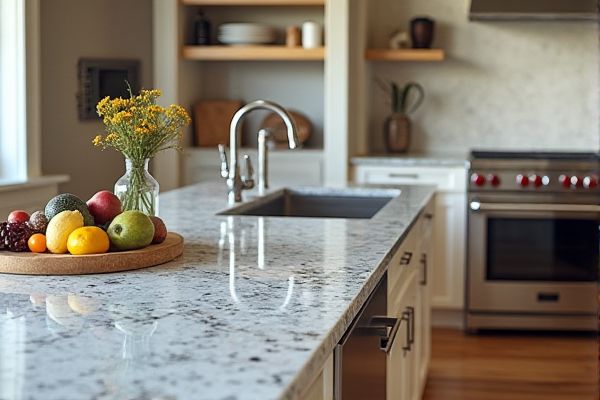
Stone countertops offer natural beauty and exceptional durability, while composite countertops provide versatility and resistance to stains and scratches. Discover the pros and cons of each option to find the perfect surface that suits your kitchen needs. Read on to explore which countertop is right for you.
Table of Comparison
| Feature | Stone Countertop | Composite Countertop |
|---|---|---|
| Material | Natural stone (granite, marble, quartzite) | Engineered mix of crushed stone and resin |
| Durability | Highly durable, resistant to heat and scratches | Durable but slightly less heat resistant |
| Maintenance | Requires periodic sealing to prevent stains | Low maintenance, non-porous surface |
| Appearance | Unique natural patterns and colors | Consistent colors and patterns, customizable |
| Cost | Higher upfront cost | More affordable options |
| Installation | Requires skilled labor, heavier materials | Easier installation, lighter weight |
| Resistance to Stains | Porous, prone to staining if not sealed | Non-porous, highly stain-resistant |
| Lifespan | Can last decades with care | Typically lasts 15-30 years |
Introduction to Stone and Composite Countertops
Stone countertops, including granite, marble, and quartzite, offer natural durability, unique patterns, and heat resistance, making them a popular choice for kitchen surfaces. Composite countertops, often made from engineered quartz or resin-based materials, provide consistent appearance, non-porous surfaces, and lower maintenance requirements compared to natural stone. Your choice between stone and composite countertops depends on aesthetic preferences, budget, and the desired balance of durability and upkeep.
Material Composition: Stone vs Composite
Stone countertops are crafted from natural materials like granite, marble, or quartzite, offering unique patterns and superior durability. Composite countertops combine crushed stone with resin or polymers, providing enhanced flexibility, uniform appearance, and resistance to stains and scratches. Your choice depends on whether you prioritize the authentic natural beauty and strength of stone or the customizable, low-maintenance properties of composite materials.
Aesthetic Appeal and Design Options
Stone countertops, such as granite and marble, offer natural variations and unique patterns that provide timeless, high-end aesthetic appeal. Composite countertops, made from engineered materials like quartz, deliver consistent colors and a wide range of design options, including customizable patterns and finishes. Your choice depends on whether you prefer the organic beauty of natural stone or the versatility and uniformity of composite surfaces.
Durability and Longevity Comparison
Stone countertops, such as granite and quartzite, offer exceptional durability with resistance to heat, scratches, and stains, often lasting 50 years or more with proper maintenance. Composite countertops, made from engineered materials like quartz resin, provide strong resistance to impact and staining but may exhibit slightly less longevity, typically around 20 to 30 years. Both options are durable, yet natural stone generally outperforms composite in terms of lifespan and enduring surface quality.
Maintenance and Care Requirements
Stone countertops such as granite and marble require regular sealing to prevent staining and maintain their durability, while composite countertops like quartz are non-porous and resist stains without sealing. Cleaning stone surfaces involves mild soap and water, avoiding acidic or abrasive cleaners that can damage the sealant, whereas composite countertops are more resistant to scratches and generally only need a soft cloth and gentle cleaner. Both materials benefit from prompt spill cleanup, but composite countertops typically demand less ongoing maintenance due to their engineered resilience.
Cost Analysis: Stone vs Composite Countertops
Stone countertops, such as granite or marble, typically incur higher costs due to natural material extraction and complex fabrication processes, with prices ranging from $50 to $200 per square foot. Composite countertops, made from engineered materials like quartz or recycled glass, generally offer a more budget-friendly option at $40 to $100 per square foot, providing durability and uniform aesthetics. Evaluating your budget alongside desired longevity and maintenance needs will help determine the most cost-effective choice for your kitchen upgrade.
Environmental Impact and Sustainability
Stone countertops, such as granite and marble, have a significant environmental impact due to quarrying, which disrupts ecosystems and consumes large amounts of energy. Composite countertops made from recycled materials like engineered quartz offer a more sustainable option by reducing waste and using eco-friendly resins. Choosing composite countertops can help you minimize your carbon footprint while enjoying durable and attractive surfaces.
Installation Process and Considerations
Stone countertops, such as granite or marble, require precise fabrication and heavyweight handling during installation, demanding professional expertise to ensure proper sealing and fit. Composite countertops, made from engineered materials like quartz, offer more uniformity and easier customization, often allowing for faster installation with less risk of cracking. Your choice should consider the installation complexity and the need for specialized tools or installers to guarantee durability and aesthetic appeal.
Pros and Cons of Stone Countertops
Stone countertops, such as granite and marble, offer natural durability and a unique, elegant appearance with heat and scratch resistance, making them ideal for high-traffic kitchens. However, they require regular sealing to prevent staining and can be prone to cracking or chipping if subjected to heavy impact. The higher cost and weight of stone countertops demand professional installation, potentially increasing overall expenses.
Pros and Cons of Composite Countertops
Composite countertops offer excellent durability, resistance to stains, and low maintenance compared to natural stone, making them ideal for busy kitchens. They provide a wide range of colors and patterns, allowing for versatile design options that mimic natural materials without the high cost. However, composite surfaces can be prone to heat damage and may show scratches more easily than granite or quartz, requiring careful use and periodic sealing.
 homyna.com
homyna.com